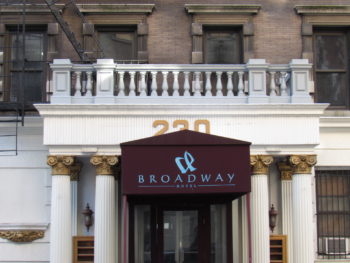
Broadway Hotel and Hostel in Manhattan. Image Credit: CityLand
Broadway Hotel sued New York City claiming the Airbnb law was unconstitutional. The City served a summons on the Broadway Hotel on the Upper West Side of Manhattan for illegal transient occupancy. The New York City Airbnb law prohibited a class A dwelling from renting out rooms on a temporary basis. The City alleged that the Hotel was a Class A dwelling and was therefore prohibited from renting out rooms on a temporary basis for any period less than 30 days.
The Hotel challenged the charge at an OATH hearing. The hearing officer agreed with the Hotel and dismissed the violations. The hearing officer ruled that the Hotel was not a “Class A” dwelling based on the history of the Hotel and its certificate of occupancy, and could therefore rent out rooms for periods less than 30 days. The City ignored the OATH decision and served the Hotel with an additional twenty-seven violations for advertising the Hotel for transient purposes. In response, the Hotel sued the City in federal court arguing that the City’s Airbnb law was unconstitutional.
U.S. District Court Judge Alvin Hellerstein ruled that the Airbnb law was constitutional, but refused to dismiss the case. Judge Hellerstein ruled that the Airbnb law was neither facially vague nor overly broad, and that the Airbnb law only prohibited “speech concerning illegal activity.” Furthermore, the law was not overly broad as it did not restrict protected speech. However, Judge Hellerstein refused to dismiss the Hotel’s complaint, ruling that the City’s application of the Airbnb law to the Hotel depended on whether the Hotel was property classified as a “Class A” dwelling. The Court continued the case to resolve the factual issue of classification.
Helms Realty Corp. v. City of New York, 320 F.Supp.3d 526 (S.D. N.Y. 2018).
By: William Gosling (William is a New York Law School student, Class of 2019)

